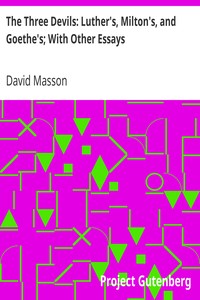The Three Devils: Luther's, Milton's, and Goethe's; With Other Essays by Masson
"The Three Devils: Luther's, Milton's, and Goethe's; With Other Essays" by David Masson is a collection of critical essays written in the late 19th century. The central theme of the opening essay revolves around the conceptions of evil as depicted by three influential figures—Luther, Milton, and Goethe—each representing the idea of evil in a distinct manner. The essay aims to analyze how these distinct portrayals reflect their respective beliefs and the cultural
context of their times. At the start of the collection, the author introduces the idea of comparing the representations of the Devil by Martin Luther, John Milton, and Johann Wolfgang von Goethe, exploring how each figures' understanding of the Evil Principle is shaped by their personal experiences and literary contexts. Luther's view of the Devil is portrayed as a personal adversary rooted in his tumultuous faith journey, while Milton’s Satan is depicted as a grand literary character in his epic work, characterized by nobility and tragic flaws. In contrast, Goethe's Mephistopheles represents a modern, cynical perspective on evil, reflecting the complexities of human society and moral ambiguity. The opening portion sets up an analytical exploration to reveal the nuances of these three devils, emphasizing their cultural and existential significance. (This is an automatically generated summary.)
Read or download for free
| How to read | Url | Size | |||
|---|---|---|---|---|---|
| Read now! | https://www.gutenberg.org/ebooks/35438.html.images | 499 kB | |||
| EPUB3 (E-readers incl. Send-to-Kindle) | https://www.gutenberg.org/ebooks/35438.epub3.images | 283 kB | |||
| EPUB (older E-readers) | https://www.gutenberg.org/ebooks/35438.epub.images | 290 kB | |||
| EPUB (no images, older E-readers) | https://www.gutenberg.org/ebooks/35438.epub.noimages | 261 kB | |||
| Kindle | https://www.gutenberg.org/ebooks/35438.kf8.images | 583 kB | |||
| older Kindles | https://www.gutenberg.org/ebooks/35438.kindle.images | 548 kB | |||
| Plain Text UTF-8 | https://www.gutenberg.org/ebooks/35438.txt.utf-8 | 464 kB | |||
| Download HTML (zip) | https://www.gutenberg.org/cache/epub/35438/pg35438-h.zip | 276 kB | |||
| There may be more files related to this item. | |||||
Similar Books
About this eBook
| Author | Masson, David, 1822-1907 |
|---|---|
| Title | The Three Devils: Luther's, Milton's, and Goethe's; With Other Essays |
| Contents | The three devils: Luther's, Milton's, and Goethe's -- Shakespeare and Goethe -- Milton's youth -- Dryden and the literature of the Restoration -- Dean Swift -- How literature may illustrate history. |
| Credits | E-text prepared by the Online Distributed Proofreading Team (www.pgdp.net) from page images generously made available by Internet Archive/American Libraries (www.archive.org/details/americana) |
| Reading Level | Reading ease score: 57.2 (10th to 12th grade). Somewhat difficult to read. |
| Language | English |
| LoC Class | PN: Language and Literatures: Literature: General, Criticism, Collections |
| Subject | Literature -- History and criticism |
| Subject | Devil in literature |
| Category | Text |
| EBook-No. | 35438 |
| Release Date | Mar 1, 2011 |
| Copyright Status | Public domain in the USA. |
| Downloads | 521 downloads in the last 30 days. |
| Project Gutenberg eBooks are always free! | |

